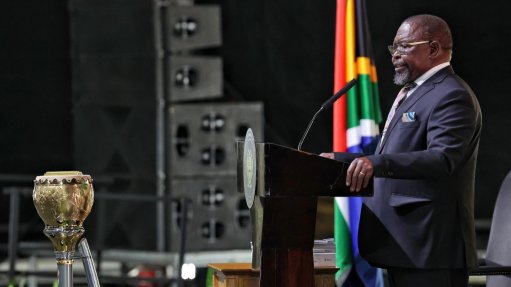SAICE launches GCC 2025 as updated framework for South Africa’s construction industry

In this video, CAS Committee member Herman Milne explains some of the changes in the GCC 2025.
The South African Institution of Civil Engineering (SAICE) has officially launched its ‘General Conditions of Contract (GCC) 2025’ publication, which has been in the works since early 2021.
The Construction Industry Development Board (CIDB) has endorsed the GCC 2025 as part of its mandate to promote and endorse uniform and ethical standards.
The GCC 2025, which will replace the previous iteration – GCC 2015 – provides an industry guide for the management and execution of civil engineering and construction projects in South Africa. It sets out clear rules, obligations and principles for contractors, employers and agents to follow, promoting fairness, accountability and ethical practice in the industry.
It serves as a key legal framework and a tool to foster collaboration, reduce conflict and ensure that infrastructure is delivered sustainably, responsibly and for the long-term benefit of society.
The document provides technical insight, best practices in construction, contract management and visionary thinking essential to addressing the complex challenges faced in South Africa when delivering civil infrastructure projects, all while dealing with the effects of climate change and ensuring resilience to enable sustainable infrastructure development.
“In launching this publication today, we reaffirm our commitment to ethical leadership, lifelong learning, and advocacy for the profession. We recognise that knowledge is a powerful tool, one that shapes how we build our economies, safeguards communities and nurtures the next generation of engineers behind us,” SAICE CEO Sekadi Phayane-Shakhane said at the launch, in Sandton, on September 2.
SAICE president Friedrich Slabbert added that the GCC 2025 was not just another book full of clauses but rather a statement of values.
“At the heart of the new document is a sentence that reads as follows: ‘The contractor, employer, and employer's agent shall carry out their contractual obligations in an honest, fair, and reasonable manner, in a spirit of mutual cooperation.’ This line is more than a legal obligation. It is a moral compass.
“It reminds us that the contract is not about protecting ourselves from each other, but about a commitment to one another,” he said.
Slabbert said the GCC 2025 held significant societal benefit.
“The test of our profession is not only whether a contract runs smoothly, but whether society benefits from what we build. When we collaborate, we deliver justice to communities and serve them,” he said.
Slabbert also addressed one of the key contestations in any contract negotiation: price.
“One thing we always battle over in contracts is value for money, which is often misunderstood. It is not about being cheap. It's about being wise. It means stewardship – that every rand that we spend we invest for a specific purpose and not waste in conflict.
“It means designing and constructing infrastructure that will not only serve us from a monetary value but for the generations to come. When we act fairly and reasonably, we not only protect the employer's investment, we are building trust,” he said.
He bemoaned that contracts were often used as a battleground rather than a platform to facilitate collaboration.
“We forget why that contract is there. It is to help us with our engagement in an orderly way. The contract is not defensive walls and weapons for contract confrontation. This contract document helps us to see each other differently. It is not a fortress. It is a framework to get at the same table and engage about the same matter for the same benefit for society,” he said.
However, Slabbert emphasised that contracts needed to be tempered with integrity and ethical practice.
“No contract can replace our conscience. No contract clause can replace integrity. Honesty, fairness, and respect are not optional extras. They are the lifeblood of trust. They are the invisible cement that lets us work together. When one party acts ethically, it inspires the next one.
“My call to all of us: if we collaborate, society works. If we act fairly, value is great. If we uphold ethics, trust deepens. When we honour obligations with honesty, dignity is preserved, and when we build with mutual cooperation, we don’t just complete projects, we complete the purpose of why we are there,” he said.
“These standards ensure that every stakeholder, from the contractor to the client, operates within a consistent and ethical framework where we can avoid ambiguity, reduce disputes which the lawyers will not be happy with, and then foster a collaborative spirit in our construction contracts,” CIDB CEO Bongani Dladla added.
KEY GCC 2025 UPDATES
The GCC 2025 introduces a number of important updates to the 2015 edition, designed to make contracts fairer, clearer and better suited to South Africa’s unique construction environment. At its core, the contract continues to balance risk between parties, but it now does so with added detail and stronger protections for contractors and employers alike.
One of the most noticeable changes is that the document is now fully gender neutral, replacing “he” and “she” with inclusive language.
A new clause has also been introduced requiring both parties to give each other advance warning of potential problems, a measure intended to improve project management and avoid unnecessary disputes.
The rules around project programming have been tightened, setting clearer expectations for what a programme must include and how often it should be updated, ensuring that projects are better managed and that claims for time extensions can be properly assessed.
Payment remains a critical issue in the industry, and while the contract cannot solve late or non-payment outright, it strengthens a contractor’s rights by allowing suspension and eventual termination if payments are not made. Interest on late payments has also been increased to the prescribed rate plus 3%, offering some relief, even if it does not fully cover contractors’ losses.
The long-standing challenge of government payment delays remains outside the contract’s control, though the industry continues to call for stronger accountability.
Other technical adjustments include shifting the point at which an employer takes occupation of a site from “completion” to “practical completion,” which better reflects the reality of how projects are handed over.
Security requirements have also been revised. Rather than enforcing automatic deductions when contractors fail to provide the correct guarantees, the contract now encourages negotiated arrangements between the parties.
Dispute resolution has seen significant refinement. Parties are encouraged to settle disagreements amicably before escalating to adjudication or arbitration, recognising that informal settlements save both time and money.
The contract introduces clearer rules around dispute boards, including both standing and ad hoc options, to mirror international best practice and help resolve issues before they spiral into costly legal battles. Importantly, a party cannot escalate a dispute to arbitration or litigation without first complying with the adjudication board’s decision.
The timelines for claims have been relaxed slightly, giving contractors 28 days to notify a claim and a further 28 days to provide details. Employers’ agents are now required to respond quickly (within seven days) if they believe a claim is time-barred, or else the claim automatically stands. This prevents late-stage technical objections from being used to undermine legitimate claims.
By clarifying responsibilities, tightening processes, and placing stronger emphasis on fairness and cooperation, the GCC 2025 aimed to provide a stronger framework for delivering South Africa’s much-needed infrastructure while reducing disputes and building trust across the industry, Slabbert said.
Article Enquiry
Email Article
Save Article
Feedback
To advertise email advertising@creamermedia.co.za or click here
Press Office
Announcements
What's On
Subscribe to improve your user experience...
Option 1 (equivalent of R125 a month):
Receive a weekly copy of Creamer Media's Engineering News & Mining Weekly magazine
(print copy for those in South Africa and e-magazine for those outside of South Africa)
Receive daily email newsletters
Access to full search results
Access archive of magazine back copies
Access to Projects in Progress
Access to ONE Research Report of your choice in PDF format
Option 2 (equivalent of R375 a month):
All benefits from Option 1
PLUS
Access to Creamer Media's Research Channel Africa for ALL Research Reports, in PDF format, on various industrial and mining sectors
including Electricity; Water; Energy Transition; Hydrogen; Roads, Rail and Ports; Coal; Gold; Platinum; Battery Metals; etc.
Already a subscriber?
Forgotten your password?
Receive weekly copy of Creamer Media's Engineering News & Mining Weekly magazine (print copy for those in South Africa and e-magazine for those outside of South Africa)
➕
Recieve daily email newsletters
➕
Access to full search results
➕
Access archive of magazine back copies
➕
Access to Projects in Progress
➕
Access to ONE Research Report of your choice in PDF format
RESEARCH CHANNEL AFRICA
R4500 (equivalent of R375 a month)
SUBSCRIBEAll benefits from Option 1
➕
Access to Creamer Media's Research Channel Africa for ALL Research Reports on various industrial and mining sectors, in PDF format, including on:
Electricity
➕
Water
➕
Energy Transition
➕
Hydrogen
➕
Roads, Rail and Ports
➕
Coal
➕
Gold
➕
Platinum
➕
Battery Metals
➕
etc.
Receive all benefits from Option 1 or Option 2 delivered to numerous people at your company
➕
Multiple User names and Passwords for simultaneous log-ins
➕
Intranet integration access to all in your organisation



















